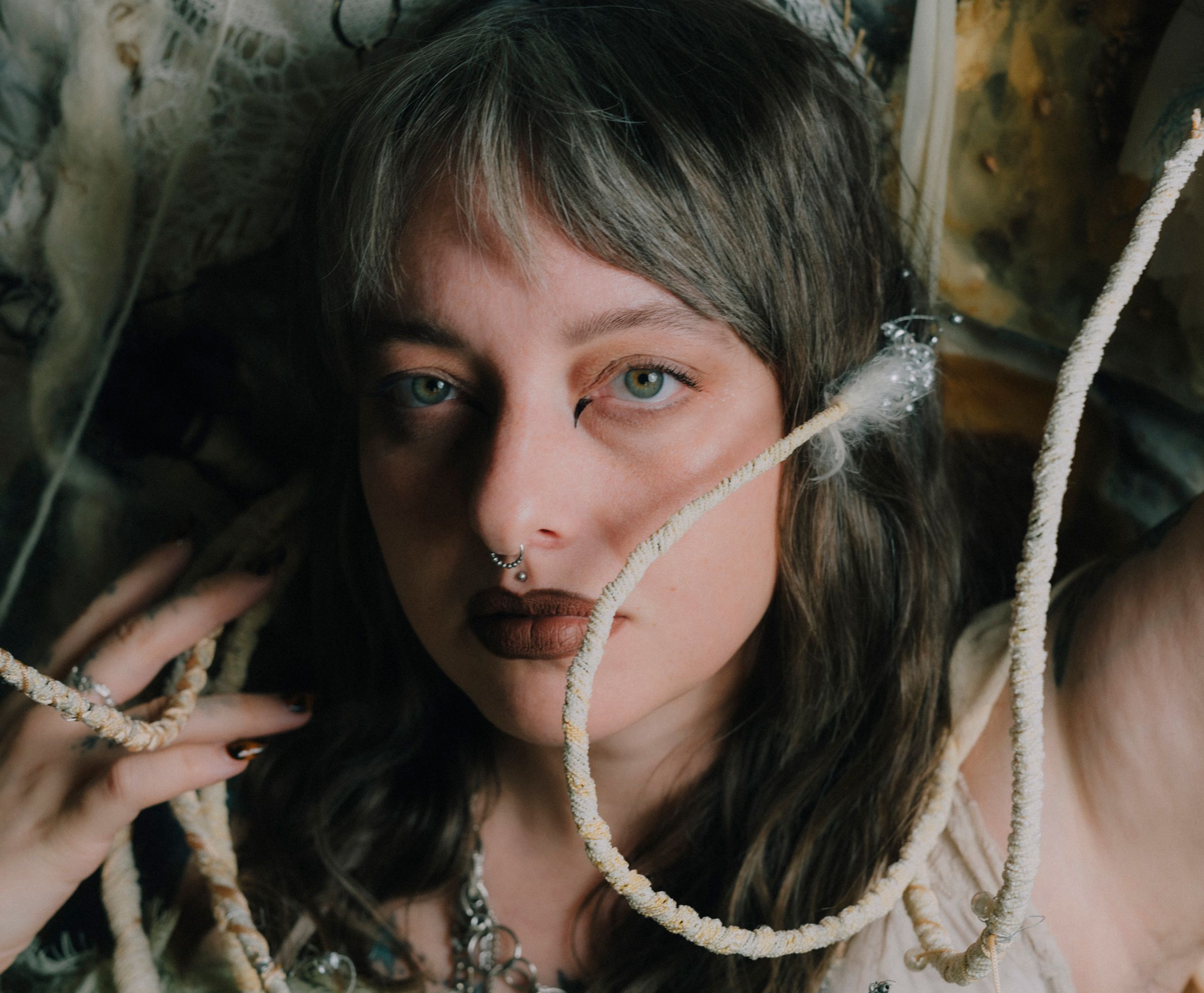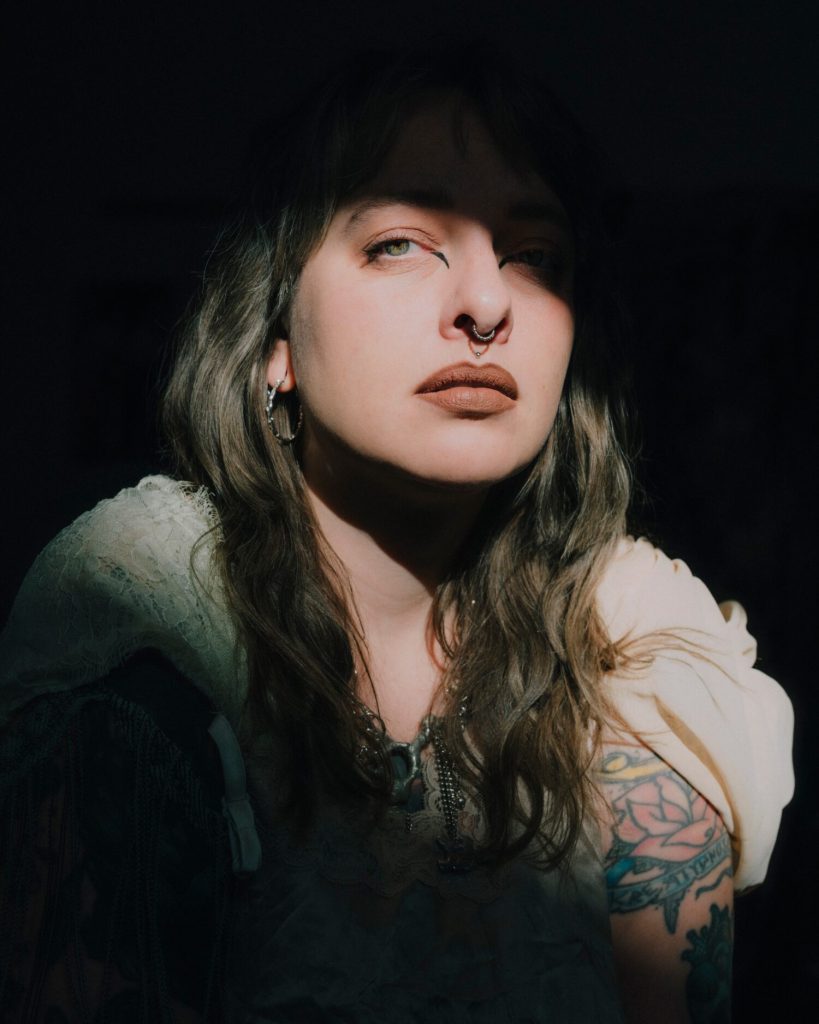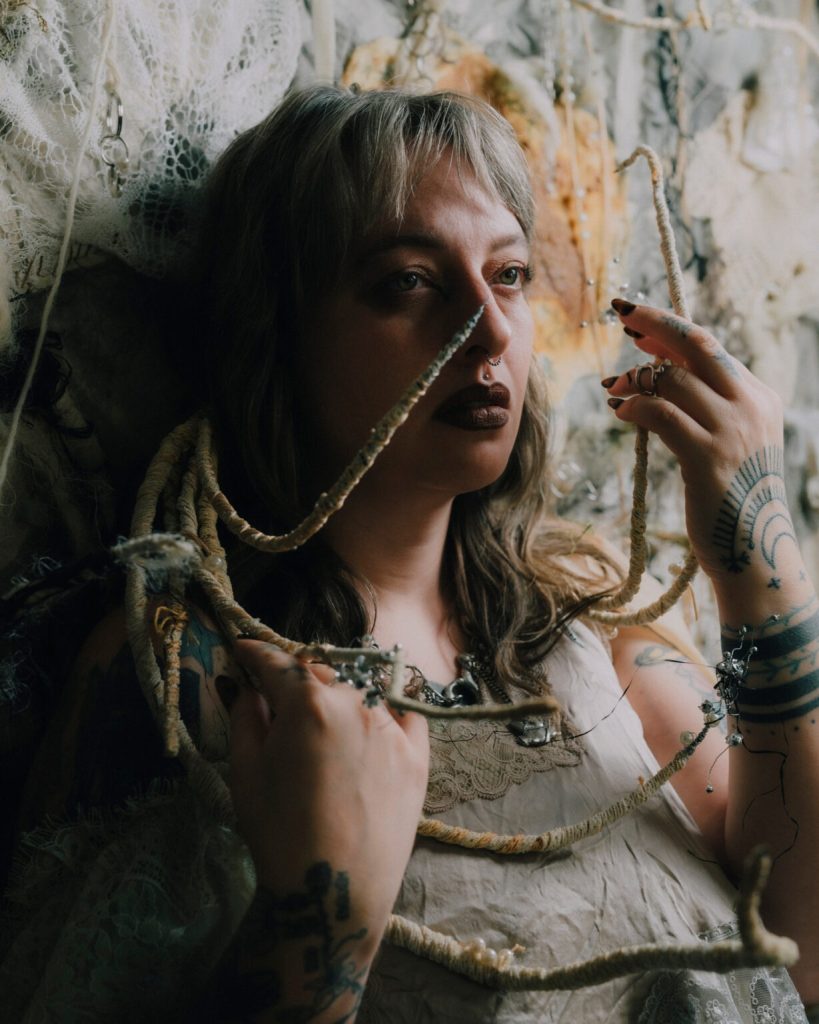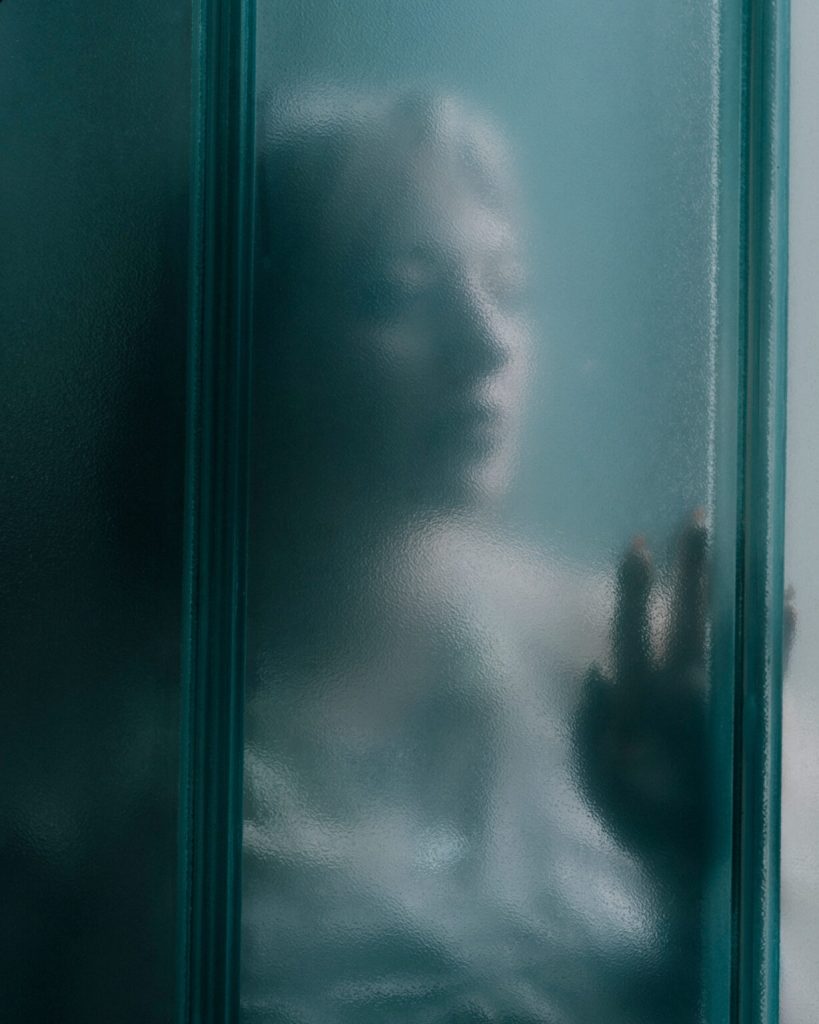“Healing is communal; it occurs in collectivity.”
Published November, 2024
by Easterndaze

Zosia Hołubowska’s music comes alive with multilayered mythical environments, emotive landscapes, fairytale-ish characters, and mystical concepts engraved in plots profound and unique in their conception and execution, well-rooted in time while defiantly spiraling towards the unknown. Overall that kaleidoscopic wonder Zosia’s story-telling power reigns, directing and distributing the wild turnings of their sound, orchestrated with the most thorough tenderness, and with the power to take the listener on a journey through an ecstatic, contemplative, playful, epic, and joyful catharsis.
Mala Herba’s sophomore album Wounded Healer was released last week on White Forest Inc., featuring a rich tapestry of collaborations with artists of matching intensity and influence. In anticipation of the new release, we spoke with the Vienna-based queer Polish composer about the creative process behind the album, their artistic journey, its joys and its struggles, and their distinctive sense of artistic, spiritual, and political confluence.
For those not yet acquainted with Mala Herba’s powerful body of work, and for those eager for more, the interview below offers deeper insight into the evocative world of Zosia’s new album Wounded Healer, laying the groundwork for what’s yet to come.
“to experiment with different energies, identities, and spaces”
Can you tell us a bit about your trajectory and how it led to Mala Herba?
I have lived in various places and participated in many bands throughout my life: from hardcore punk and goth to synth-pop. Eight years ago I moved to Vienna by myself. At first, I started performing in gallery spaces because I was interested in exploring the performance set up. But soon I realized that I was craving the energy of a different setting, that of a dark club where people are dancing. That’s when I created Mala Herba as a means to experiment with different energies, identities, and spaces.
What is the difference between the persona that you developed in Mala Herba and your solo project that goes by your name, Zosia Hołobowska?
As Zosia, I tend to perform in institutional spaces, and to create work aligned with the domains of contemporary electronic music and sound art. On the other hand, Mala Herba is an imaginative and performative project, which I view less as my career path and more as a space that gives me the freedom to experiment, express, and enjoy. I try to keep these two projects separate, although it is not always easy. For example, one can’t develop two visual identities without merging or intertwining. But it’s an interesting experiment.
“an intermediary layer between my bare heart and the audience”
Wearing elaborate costumes and set designs that evoke vivid imagery is a choice that seems to define Mala Herba. What does this choice mean to you?
At the beginning of Mala Herba, I wanted to be a very sexy demonic witch and I chose aesthetics that would summon this character. Throughout the years this changed, maybe because I don’t have the same confidence as I used to. But even so, costumes are still very important to the project. They serve as an intermediary layer between my bare heart and the audience. Either way, performing is extremely personal and I feel very vulnerable on stage. At first, I was hoping that Mala Herba’s props would protect me from exposure. Instead, I find that I end up exposing myself even more. If I were just dressed in my everyday clothes, if I were “just being myself”, it would be a different story. But once I go into these lavish, outlandish stage designs, a magical, imaginary world opens up, and it gets personal; I’m suddenly revealing some of my dreams and desires on stage.
It looks like you’ve been creating this new album for 3 years now. How did we get from Demonologia to Wounded Healer?
It takes quite a long time between finishing a record and releasing it. I started working on new material, almost as soon as I finished my first album, Demonologia. My taste and my horizons changed in the last few years. I met new people and they introduced me to completely new music that I’d never heard of. Once this happened I wanted to explore much more experimental and conceptual approaches to composition. That’s what turned the production of Wounded Healer into a very long and slow process. Especially because I felt it should be collaborative work. This meant I suddenly had 20 different people involved, and when you are connected to 20 different schedules there is a lot of coordination, emails, and waiting time. On top of that, I’m not the kind of artist who can go to the studio for a couple of weeks and come out with an album. I do everything at home. I have some periods when I can’t work or when I don’t feel inspired. There are weeks or months when I don’t do anything with the album because I don’t know what to do, I don’t have head space or I feel low and insecure. And then after some time, I go back to it. So this is why it took so long.
“writing stories that are inspired by Slavic wisdom”
Did you start with the idea of the album as it concluded or did it take shape along the way?
I didn’t start with a very clear idea. I set off working on songs, writing stories that are inspired by Slavic wisdom and traditions, and researching magic, rituals, and symbols. I have always had this idea about Mala Herba’s music as being a ritual, eliciting a magical suspended state, if you please. Before long, as I was working on it, the album started to move towards healing themes, because I am interested in therapeutic concepts and practices. Then it just all started coming together. At the same time, I got inspired by artists like Madonna or David Bowie who would create different personas for each record. It sounds old school, but I find that’s a fascinating concept. At that point, I was tired of this goth BDSM which imagery Mala Herba started with – I just couldn’t relate to it anymore. So I said, “Okay, fuck it, let’s do something else now”. At the end of the day, it’s my party.

So, it is your party but it is also a collaborative process, at least in Wounded Healer.
My debut album, Demonologia, was all composed by me in my room. I was learning by doing. Except for that, I’ve always really enjoyed collaborating, especially with artists from different disciplines, because I like to create rich, immersive, multi-dimensional experiences, and I don’t always have all the kinds of know-how this requires. So, I enjoy exchanging skills. In Wounded Healer I even took a step further – I invited other musicians to collaborate on the album. It was a very enriching and interesting process. There were times when I didn’t know how to continue a track, and times when I thought I had an idea when someone would send their contribution and by doing so would take this track into a completely different place that I would not have found on my own.
So what were the rules for the collaborative process in Wounded Healer?
I would send a sketch to each person, and wait for their response, without asking for particular tasks. People could choose how they wanted to work with the material freely, whether with a cello, their voice, or any other means. There are times when my collaborator was a very skilled singer but they decided to play an instrument, and the other way around. After receiving the initial material, each person would send me back a contribution and I would then mix their part into the production. Later I would send the work back to them for final approval. That’s how the process was unrolled, and I kept myself extremely open throughout.
Are you the one who writes all the lyrics for this album?
With one exception, yes. There is a moment in the 8th track, Nikt, where Enesi sings in Portuguese. She wrote her lyrics for this part.
“I am very rooted in my spiritual practice in transformative justice”
“working towards systemic change”
There is a recurrent theme of enchantment in your work. What does witchcraft mean for you?
Witchcraft for me is a way of relating to the world with a form of agency, a way of having an impact on reality, a framework of thinking. I am very rooted in my spiritual practice in transformative justice, working towards systemic change grounded in anti-imperialist principles, and feminist and queer thinking. That’s witchcraft for me. With Mala Herba, I’ve always strived to create safer spaces with my music for bodies that experience violence or oppression daily. Wounded Healer is a step forward. It comes out of my need to offer materials and communal resources that can help people find a moment of refuge, in these fucked up times. That’s how I see this project.
“I’ve been a queer feminist and anti-racist activist since I was 16 years old.”
You talk about spiritual practice and political practice at once.
For me spiritual, political, and artistic practice are one. I’ve been a queer feminist and anti-racist activist since I was 16 years old. And it’s extremely important to me to think about these topics on a personal level. I say it again and again: feminism saved my life. So these are the topics that I’m occupied with on a personal, political, and artistic level. They play a crucial role in my practice and my life. Other forms of political action I’ve been engaged with in the past proved to be unsuccessful, and void. I couldn’t see the change that I was fighting for. So I decided to try something else: witchcraft.
“critically reworking archives”
I want this type of knowledge, magic, and music to be my lived, embodied experience

How do your cultural origins interfere with your artistic practice?
To me this is fundamental. When I talk about spirituality, I want to differentiate myself from the kind of unreflective, new-age, culturally appropriative practices that consist of consuming different cultures for the sake of self-indulgence. Instead, I try to route everything that I do to where I’m from. And I’m from Eastern Europe. So this is the heritage I research on and engage with. Not because I am a nationalist – I am not. But because I’m interested in critically reworking archives, in finding out what is there, what is not there, and why, how has this presence or absence been instrumentalized, and how can I animate it? Bear in mind that I am not interested in reconstructive work or restoration. On the contrary, I want this type of knowledge, magic, and music to be my lived, embodied experience. I want it to be relevant, and relatable.
Would you like to tell us a little bit about the first video from the album, Chleb?
The video for Chleb emerged from a collaboration with Agata Sokół, a performer with whom I have worked on another performance. Two years ago we visited the Lindabrunn Stone Symposium together and we recorded some materials in that beautiful sculptural setting. My dear friend and collaborator Joanna Zabierska joined us, scanned us in 3D, and created magical, mythical landscapes out of these materials.
Can we expect something similar from Wounded Healer’s live show?
Indeed my collaboration with Joanna Zabierska, glimpses of which can be seen in Chleb will be part of the new live show. Besides that, Alma Bektas created a scenography centered around a texturally rich, altar-like tapestry, blending vintage lace with various gathered materials, such as wheat roots I cultivated and submerged in latex.
In the album press release you reference the ancient Greek myth of Chiron, a centaur. Was it their hybridity that attracted you to this myth?
I was more interested in Chiron as the archetype for a wounded healer, as in someone who is hurt and healing their traumas but who at the same time has the urge to heal others. That’s how I see myself; as a healer in training. At the same time, I’m also going through therapy.
“Healing is communal; it occurs in collectivity.”
What’s your approach to healing?
I have been thinking a lot about that, and it’s become clear to me that healing is not something that I can simply give to someone. It’s a quality that’s being created in the community, it lies in the interactions between individuals. This is something that I’ve come to realize through my performances. I’m not a bottomless well of energy, so healing is not something that I can extract from myself and hand to another. Healing is communal; it occurs in collectivity.
Do you identify as a migrant? How does this influence your music? For example, your lyrics are in Polish but I assume you communicate in other languages in daily life.
I am a migrant, and I’m very proud of it, especially in the context of Austria and after the recent election results. I think migration is not only a human right but the essence of humanity and history. So I’m not going anywhere, I have a right to be here. In my daily life, I speak English or German. I have written lyrics in English in the past for other works, but for this album, I was so immersed in archaic music and this particular style of singing, that I would not have been able to produce it in any language other than Polish. It just would not have worked.
What are your music influences for this album and this kind of singing?
I’ve been studying archaic Eastern European singing for many years with different teachers. I’m fortunate to have had both Agata Hartz and Remek Hanaj, the founders of one of the most important bands to me, Księżyc, as my mentors. Their approach to traditional music is to keep its grain as a living practice, rather than reduce it to a recreation based on rigid ethnomusicological rules. And that is also very significant for me.
Besides that, I follow the work of contemporary composers that focus on the voice. In this aspect, Holly Herndon is a major inspiration for me. Other than that, I’m a big fan of Tarta Relena, a band that works with Spanish, Catalan, and Mediterranean medieval folk songs as their material. While I was working on this new album, I’ve also been listening obsessively to the album Aura by Ainu vocalist Hatis Noit. And then of course I love Diamanda Galas, and producers like Hiro Kone, and bands like HIDE.
Could you tell us a bit more about your relationship with your voice?
I don’t think I can express enough how important singing is to me. It is the biggest pleasure and meaning in my life. But on the other hand, alongside my singing, I would like to also be recognized as a composer and a producer in my own right. This is why on a lot of tracks in Wounded Healer I took a step back and let someone else do the singing. It’s because I wanted to push myself to take the role of the composer.
So, what is your approach to music composition and production?
I try to be as explorative as I can. I don’t think about tracks in terms of conventional song structures as in sequences of chorus and verse. I think of them as stories or landscapes. I also find inspiration in traditional song structures that are different from standard pop songwriting. In the music I had been producing as Mala Herba before this album, the tracks were rhythmical and dancey, as if written for the club. Wounded Healer marks a big departure from that style of composition. In this new album, I go deep into polyrhythms, rhythmic fluctuations, and metric changes. This stems from my desire to create the sensation of pulsation, a hypnotic and ritualistic state, the feeling of wanting – or of being on the verge of wanting – to move. During the process, I struggled to find my balance between my urge to create something danceable and my urge to run away from the same. Whenever I would end up with a techno track, I would leave it, take some distance, and go back to it after a few weeks to deconstruct it, make it super weird, and destroy it completely. That was the creative workflow behind the album and I must say I truly enjoyed it.

Is there a special story behind the name ‘Mala Herba’?
‘Mala herba’ means ‘evil herb’ in Latin. In English the direct translation would be ‘evil weed’, and this word has already strong genre connotations. The concept is akin to what we call ‘Unkraut’ in German; A plant that grows by itself, while no one cultivates it. Interestingly such plants are often regarded as pests, yet they possess amazing, magical nutritional and health benefits. When I was starting with Mala Herba I was fascinated with the concept of ‘No one planted me, but here I am’. And that’s how the name came about.
Have you encountered any discrimination or marginalization while pursuing your artistic vision, especially from the position of a politically engaged queer migrant electronic musician from Eastern Europe?
This is a very painful topic, because there have been moments where I felt very ignored and unseen, but I am sometimes unsure about whether it is discrimination, my anxiety, and paranoia, or the fact that I’m just not good enough. For example last year I was not invited to play in a single Austrian festival. Although I have lived here for 8 years and have played in over 20 countries all around Europe, there are still a lot of local festivals that have never approached me, and I barely ever appear in Austrian media. I also definitely feel that artists from Eastern Europe who are very vocal about their cultural heritage and actively engage with it, rather than simply relocating let’s say to Berlin and blending in, are significantly underrepresented and not taken seriously. It’s very difficult to enter the scenes and secure a spot in well-known artist rosters anyway, but some reasons make it even harder.
I recall coming across an infographic from Oramics a few years ago that highlighted the unequal representation of artists from what is often referred to as ‘the periphery’ of Europe in the prominent contemporary electronic music press, as compared to artists that come from more privileged environments.
On a personal level it creates a lot of anxiety and bitterness and it’s very difficult to deal with it. I feel it especially now that I’m again self-releasing as an independent artist and I’m doing the promotion of the album by myself. I see how it is that you send hundreds of emails and no one responds. The same happens when trying to approach some festivals – no one cares to even answer. I know that there’s a great saturation in the music scene and not enough media infrastructure to accommodate all the new music that would like to be presented. So I think it’s a combination of a lot of things. Also, the fact that I’m older. Maybe I’m not as attractive as a new act on the scene.
These are insecurities we all have in the scene. Maybe I would like to ask you how you manage to cope with them and not let them discourage you.
So, first of all, I block my Instagram feed. I don’t keep track of festivals or follow what other artists do to not compare myself because it destroys my spirit. Then I try to forget all that is not essential and to focus on the message of my work. Another thing that helps is what my close friend calls an ‘ego death’: that is, to refrain from having these ambitions of becoming big, making it, and playing at this or that dream festival. Instead, I’m trying to concentrate on these little gigs where people want you to be there, and where you can have a genuine connection with the audience. That’s much more important than playing at some fancy festival, where it doesn’t make any difference if you’re there or not. That’s what I’m trying to cultivate. I also developed a grounding ritual which I do before I go on stage. It’s quite simple but I’m testing it and it helps.
Is it a secret?
No, it’s not a secret. I do a lot of stretches. I do some vocal warm-ups, and then I try to read a bit of poetry just before I start performing.
What kind of poetry? Do you have some recommendations?
I like these pages on IG, poetryisnotaluxury, and blackliturgies.
So what is coming next for Mala Herba? Anything that we should know about?
I have some upcoming shows where I will be presenting Wounded Healer, and I will be searching for more opportunities. In November I’m doing a little tour in the Czech Republic, Slovakia and Hungary. I’m also planning a tour of Southeast Asia in the coming year. But I don’t want to jinx it yet.
Thanks a lot for the conversation!
Interview: Daphne Xanthopoulou, Photography: Ronja Kappl
This article is brought to you by Struma+Iodine as part of the EM GUIDE project – an initiative dedicated to empowering independent music magazines and strengthen the underground music scene in Europe. Read more about the project at emgui.de
Funded by the European Union. Views and opinions expressed are however those of the author(s) only and do not necessarily reflect those of the European Union or the European Education and Culture Executive Agency (EACEA). Neither the European Union nor EACEA can be held responsible for them.